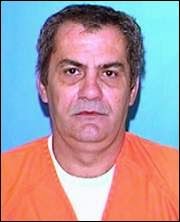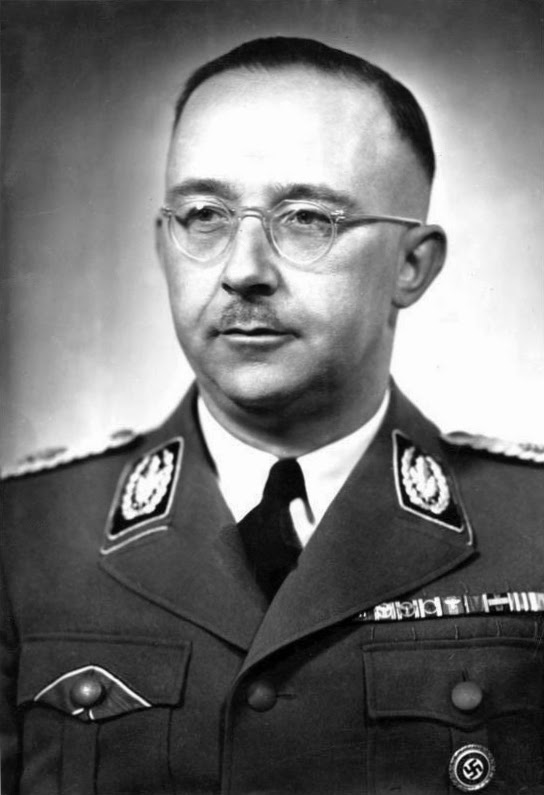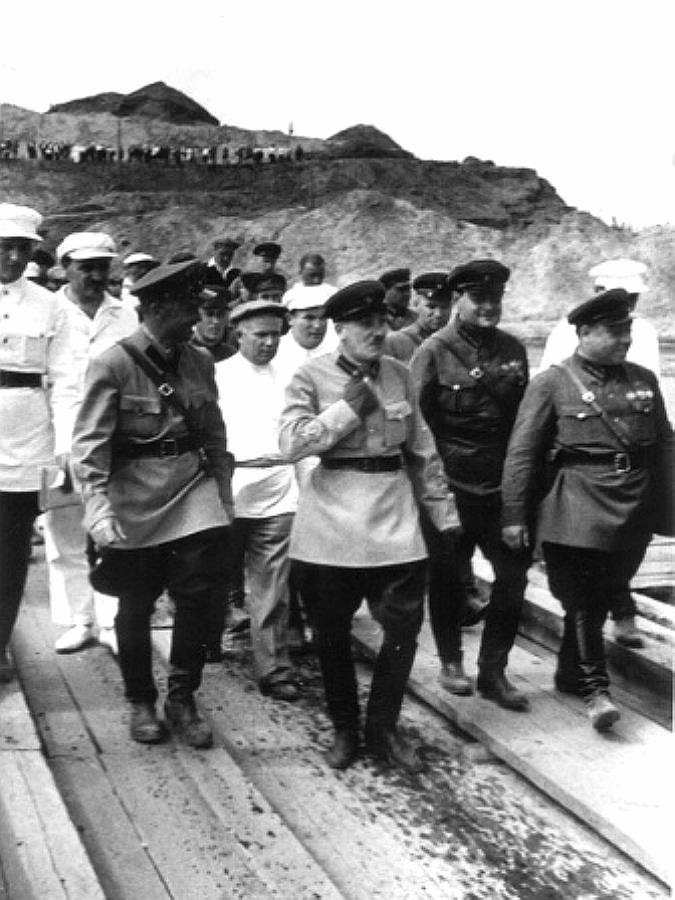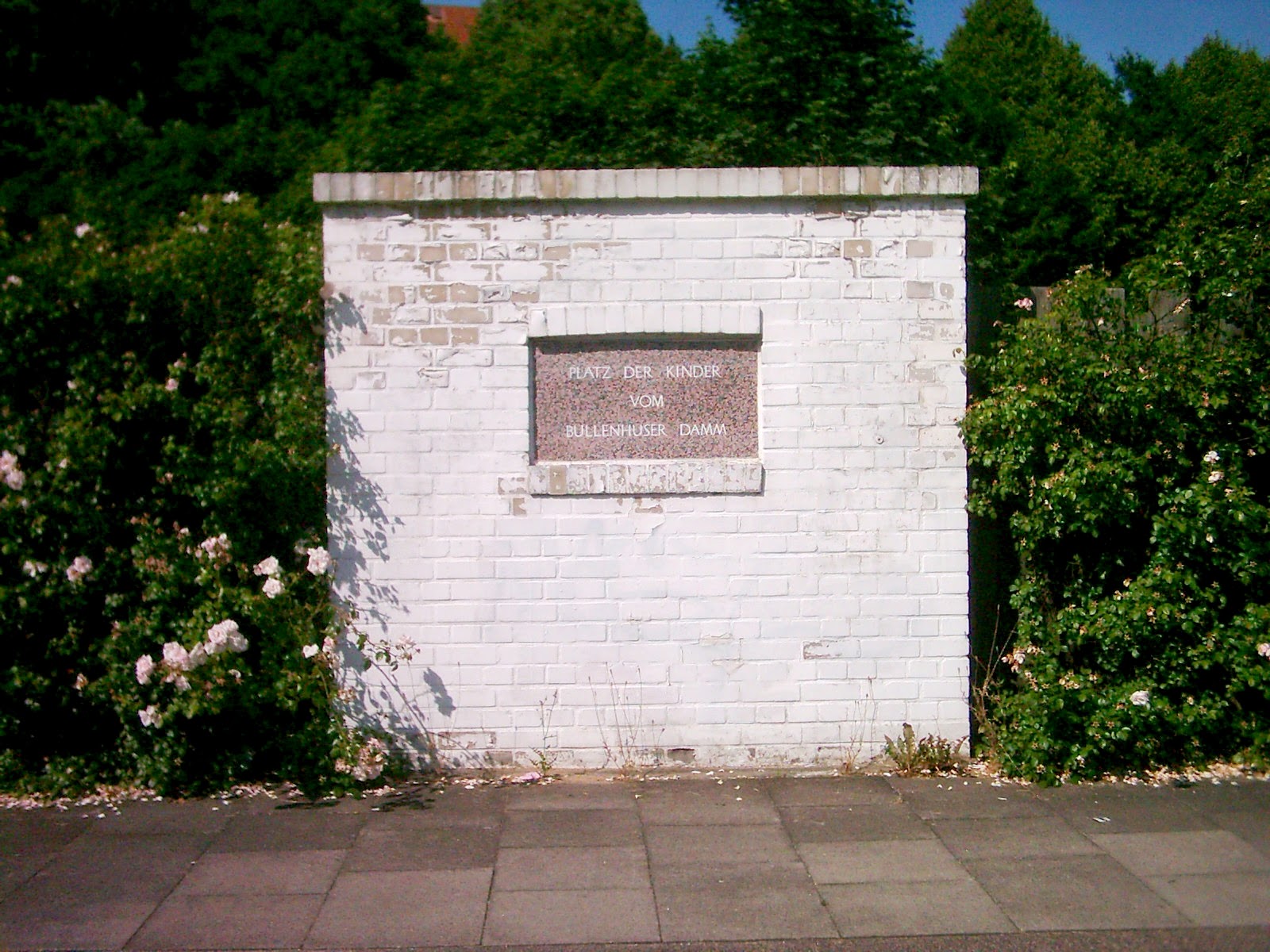| What follows is an excerpt from the speech held by Heinrich Himmler before the Reichsleiter and Gauleiter of the NSDAP in Posen on 6 October 1943. The source of the text is: Märthesheimer/Frenzel, Im Kreuzfeuer: Der Fernsehfilm Holocaust. Eine Nation ist betroffen, Fischer Taschenbuch Verlag GmbH Frankfurt am Main 1979, pages 112 to 114. Reference of quote: Heinrich Himmler, Geheimreden 1933 bis 1945, edited by Bradley F. Smith and Agnes F. Peterson, Berlin 1974, pages 169 and following.
Quote: Ich darf hier in diesem Zusammenhang und in diesem allerengsten Kreise auf eine Frage hinweisen, die Sie, meine Parteigenossen, alle als selbstverständlich hingenommen haben, die aber fr mich die schwerste Frage meines Lebens geworden ist, die Judenfrage. Sie alle nehmen es als selbstverständlich und erfreulich hin, da in Ihrem Gau keine Juden mehr sind. Alle deutschen Menschen abgesehen von einzelnen Ausnahmen sind sich auch darüber klar, daß wir den Bombenkrieg, die Belastungen des vierten und des vielleicht kommenden fünften und sechsten Kriegsjahres nicht ausgehalten hätten und nicht aushalten würden, wenn wir diese zersetzende Pest noch in unserem Volkskörper hätten. Der Satz Die Juden müssen ausgerottet werden mit seinen wenigen Worten, meine Herren, ist leicht ausgesprochen. Für den, der durchführen muß, was er fordert, ist es das Allerhärteste und Schwerste, was es gibt. Sehen Sie, natürlich sind es Juden, es ist ganz klar, es sind nur Juden, bedenken Sie aber selbst, wie viele auch Parteigenossen ihr berühmtes Gesuch an mich oder irgendeine Stelle gerichtet haben, in dem es hieß, da alle Juden selbstverständlich Schweine seien, daß bloß der Soundso ein anständiger Jude sei, dem man nichts tun dürfe. Ich wage zu behaupten, da es nach der Anzahl der Gesuche und der Anzahl der Meinungen in Deutschland mehr anständige Juden gegeben hat als überhaupt nominell vorhanden waren. In Deutschland haben wir nämlich so viele Millionen Menschen, die ihren einen berühmten anständigen Juden haben, daß diese Zahl bereits größer ist als die Zahl der Juden. Ich will das bloß ausführen, weil Sie aus dem Lebensbereich Ihres eigenen Gaues bei achtbaren und anständigen nationalsozialistischen Menschen feststellen können, da auch von ihnen jeder einen anständigen Juden kennt.
Ich bitte Sie, das, was ich Ihnen in diesem Kreise sage, wirklich nur zu hören und nie darüber zu sprechen. Es trat an uns die Frage heran: Wie ist es mit den Frauen und Kindern? Ich habe mich entschlossen, auch hier eine ganz klare Lösung zu finden. Ich hielt mich nämlich nicht für berechtigt, die Männer auszurotten sprich also, umzubringen oder umbringen zu lassen und die Rächer in Gestalt der Kinder für unsere Söhne und Enkel groß werden zu lassen. Es mute der schwere Entschluß gefaßt werden, dieses Volk von der Erde verschwinden zu lassen. Für die Organisation, die den Auftrag durchführen mute, war es der schwerste, den wir bisher hatten. Er ist durchgeführt worden, ohne daß wie ich glaube sagen zu können unsere Männer und unsere Führer einen Schaden an Geist und Seele erlitten hätten. Der Weg zwischen den hier bestehenden Möglichkeiten, entweder roh zu werden, herzlos zu werden und menschliches Leben nicht mehr zu achten oder weich zu werden und durchzudrehen bis zu Nervenzusammenbrüchen, der Weg zwischen dieser Scylla und Charybdis ist entsetzlich schmal.
Wir haben das Vermögen, daß wir bei den Juden beschlagnahmten es ging in unendliche Werte -, bis zum letzten Pfennig an den Reichswirtschaftsminister abgeführt. Ich habe mich immer auf den Standpunkt gestellt: Wir haben die Verpflichtung unserem Volke, unserer Rasse gegenüber, wenn wir den Krieg gewinnen wollen, wir haben die Verpflichtung unserem Führer gegenüber, der nun in 2000 Jahren unserem Volke einmal geschenkt worden ist, hier nicht klein zu sein und hier konsequent zu sein. Wir haben nicht das Recht, auch nur einen Pfennig von dem beschlagnahmten Judenvermögen zu nehmen. Ich habe von vornherein festgesetzt, da SS-Männer, auch wenn sie nur eine Mark davon nehmen, des Todes sind. Ich habe in den letzten Tagen deswegen einige, ich kann es ruhig sagen, es sind etwa ein Dutzend Todesurteile unterschrieben. Hier muß man hart sein, wenn nicht das Ganze darunter leiden soll. Ich habe mich für verpflichtet gehalten, zu Ihnen als den obersten Willensträgern, als den obersten Würdenträgern der Partei, dieses politischen Ordens, dieses politischen Instruments des Führers, auch über diese Frage einmal ganz offen zu sprechen und zu sagen, wie es gewesen ist.
Die Judenfrage in den von uns besetzten Ländern wird bis Ende dieses Jahres erledigt sein. Es werden nur Restbestände von einzelnen Juden übrig bleiben, die untergeschlüpft sind. Die Frage der mit nichtjüdischen Teilen verheirateten Juden und die Frage der Halbjuden werden sinngemäß und vernünftig untersucht, entschieden und dann gelöst.
Daß ich große Schwierigkeiten mit vielen wirtschaftlichen Einrichtungen hatte, werden Sie mir glauben. Ich habe in den Etappengebieten große Judengettos ausgeräumt. In Warschau haben wir in einem Judengetto vier Wochen Straßenkampf gehabt. Vier Wochen! Wir haben dort ungefähr 700 Bunker ausgehoben. Dieses ganze Getto machte also Pelzmäntel, Kleider und ähnliches. Wenn man früher dort hinlangen wollte, so hieß es: Halt! Sie stören die Kriegswirtschaft! Halt! Rüstungsbetrieb! Natürlich hat das mit Parteigenossen Speer gar nichts zu tun, Sie können gar nichts dazu. Es ist der Teil von angeblichen Rüstungsbetrieben, die der Parteigenosse Speer und ich in den nächsten Wochen und Monaten gemeinsam reinigen wollen. Das werden wir genauso unsentimental machen, wie im fünften Kriegsjahr alle Dinge unsentimental, aber mit großem Herzen für Deutschland gemacht werden müssen.
Damit möchte ich die Judenfrage abschließen. Sie wissen nun Bescheid, und Sie behalten es für sich. Man wird vielleicht in ganz später Zeit sich einmal überlegen können, ob man dem deutschen Volke etwas mehr darüber sagt. Ich glaube, es ist besser wir, wir insgesamt haben das für unser Volk getragen, haben die Verantwortung auf uns genommen (die Verantwortung für eine Tat, nicht für eine Idee) und nehmen dann das Geheimnis mit uns ins Grab.
My translation:
Quote: I allow myself, in this context and in this most restricted circle, to point to an question that you, my fellow party members, have all taken for granted, but that for me has become the most difficult question of my life, the Jewish question. You all take it for granted and a pleasant fact that in your Gau there are no more Jews. All German people apart from some exceptions are also clearly aware that we wouldn’t have withstood or withstand the bombing war, the hardships of the fourth and maybe the fifth and sixth war year, if we still had this disintegrating plague in our body popular. The sentence: The Jews must be exterminated with its few words, my dear Sirs, is easily pronounced. For him who must carry out what is required it is the toughest and most difficult thing there is. You see, of course they are Jews, it is very clear, they are just Jews, but consider yourselves how many, also party members addressed their famous request to me or any other entity wherein it said that all Jews were swine of course, that only so-and-so was a decent Jew who was not to be harmed. I dare assert that by the number of requests and the number of opinions there have been more decent Jews in Germany than nominally existed at all. This because in Germany we have so many million people who had their famous one decent Jew that this number is already larger than the number of Jews. I only want to address this because you are able to observe in respectable and decent National Socialist individuals from the living area of your own Gau, that each of them also knows a decent Jew.
I ask you that what I tell you in this circle you will really only hear and never talk about it. The question came up to us: What do to with the women and children? I decided to find a very clear solution also in this respect. This because I didn’t consider myself entitled to exterminate the men, that is, to kill them or to have them killed, and to let the children grow up as avengers against our sons and grandsons. The difficult decision had to be taken to make this people disappear from the earth. For the organization that had to carry out the task if was the most difficult we had so far. It has been carried out without, as I consider myself entitled to say, our men and our leaders having taken harm to their spirit and soul. The path between the possibilities existing here, to either become crude and heartless and no longer to respect human life or to become weak and collapse to the point of nervous breakdowns, the path between this Scylla and Charybdis is horrendously narrow.
The patrimony that we confiscated from the Jews it reached endless values we have transferred to the last Pfennig to the Reich Minister of Economics. I have always held this position: We have the duty towards our people, our race, if we want to win the war, we have the duty towards our Führer, who has been given to our people this one time in 2000 years, not to be miserly and to be consequent in this respect. We don’t have the right to take even a Pfennig of the confiscated Jewish property. I have established from the very start that SS men will be punished by death if they take as much a one mark of it. In the last days I have thus, I have no problem saying this, signed about a dozen death sentences. In these things you must be tough lest the whole be affected by them. I have considered myself under the obligation to once speak with all openness to you as the main carriers of the will, the main dignitaries of the party, this political order, this political instrument of the Führer, also about this question and to tell you how it has been.
The Jewish question in the countries occupied by us will be solved until the end of this year. There will remain only a few individual hidden Jews. The question as to Jews married to non-Jewish partners and the question of the half-Jews will be correspondingly and reasonably examined, decided upon and then solved.
You will believe that I had great difficulties with economic institutions. I have cleared many Jewish ghettoes in the rear areas. In Warsaw we had four weeks of street fighting in one Jewish ghetto. Four weeks! We there took out about 700 bunkers. So this whole ghetto made fur coats, clothes and similar things. If you formerly tried to get at it, someone said: Stop! You are disturbing the war economy! Stop! Armament factory! Of course this has nothing to do with fellow party member Speer, you can do nothing about it. It is the part of alleged armament factories that fellow party member Speer and I will jointly clean up in the next weeks and months. We will do that as unsentimentally as everything in the fifth year of the war has to be done unsentimentally, but with a great heart for Germany.
With this I want to conclude the Jewish question. You are now informed, and you will keep it to yourselves. Maybe a long time hereafter one may think about whether the German people is to be told more about it. I think it is better if we, we all together, have done this for our people, have taken the responsibility onto ourselves (the responsibility for a deed, not for an idea) and then take the secret with us to the grave. |

































